About the Electronics (Instrumentation and Control) Engineering Program
Programme emphasis is on creating highly competent engineers who would be able to contribute in designing, developing, installing, managing and maintaining instruments for measurement, control and automation. The core subjects are industrial instrumentation, process control, bio-medical instrumentation and signal processing.
After completion of semester V (3rd year) of the programme, you have a choice to choose one out of the three specialization in the programme by choosing the courses in electives offered and get certification for the same. Focus areas (specializations in programme) include.
- Industrial Automation
- Biomedical Instrumentation
- Smart Systems
Updated curriculum in line with industry needs and outcome based education. The curriculum and pedagogy include
- Experiential learning through capstone project and other activities which engages students in critical thinking, problem solving and decision making in contexts that are relevant to engineering.
- 6 months internship focused on carrying out projects and problem solving.
Placements in prestigious companies.
Program Educational Objectives (PEOs)
- To demonstrate a high degree of technical expertise in Electronics (Instrumentation and Control) Engineering profession with effective communication and management skills.
- To pursue higher education to continue their intellectual development for life-long learning.
- To achieve leadership roles in multidisciplinary teams, thereby serving the society as ethical and conscientious professionals.
Program Outcomes (POs)
- Engineering knowledge: Apply the knowledge of mathematics, science, engineering fundamentals, and an engineering specialization to the solution of complex engineering problems.
- Problem analysis: Identify, formulate, review research literature, and analyze complex engineering problems reaching substantiated conclusions using first principles of mathematics, natural sciences, and engineering sciences.
- Design/development of solutions: Design solutions for complex engineering problems and design system components or processes that meet the specified needs with appropriate consideration for the public health and safety, and the cultural, societal, and environmental considerations.
- Conduct investigations of complex problems: Use research-based knowledge and research methods including design of experiments, analysis and interpretation of data, and synthesis of the information to provide valid conclusions for complex problems.
- Modern tool usage: Create, select, and apply appropriate techniques, resources, and modern engineering and IT tools including prediction and modeling to complex engineering activities with an understanding of the limitations.
- The engineer and society: Apply reasoning informed by the contextual knowledge to assess societal, health, safety, legal and cultural issues and the consequent responsibilities relevant to the professional engineering practice.
- Environment and sustainability: Understand the impact of the professional engineering solutions in societal and environmental contexts, and demonstrate the knowledge of, and need for sustainable development.
- Ethics: Apply ethical principles and commit to professional ethics and responsibilities and norms of the engineering practice.
- Individual and team work: Function effectively as an individual, and as a member or leader in diverse teams, and in multidisciplinary settings.
- Communication: Communicate effectively on complex engineering activities with the engineering community and with society at large, such as, being able to comprehend and write effective reports and design documentation, make effective presentations, and give and receive clear instructions
- Project management and finance: Demonstrate knowledge and understanding of the engineering and management principles and apply these to one’s own work, as a member and leader in a team, to manage projects and in multidisciplinary environments.
- Life-long learning: Recognize the need for, and have the preparation and ability to engage in independent and life-long learning in the broadest context of technological change.
Program Specific Outcomes (PSOs)
- To apply knowledge of mathematics, sciences and professional subjects to formulate, interpret and analyse problems appropriate to Electronics (Instrumentation and Control) Engineering
- To employ appropriate engineering techniques, skills, tools and research based knowledge to realize Electronics (Instrumentation and Control) Engineering systems and engage in life- long learning.
Student Outcomes (SOs)
Student Outcomes-Click here to view
Program Enrollment and Degree Data
Program Enrollment and Degree Data- Click here to view
Placement Data
Placement Data of 2022-23: Click here to download
Placement Data of 2021-22: Click here to download
Placement Data of 2020-21 : Click here to download
Placement Data of 2019-20 : Click here to download
Course Structural Scheme
Click Here to download 2020-24 Scheme PDF
Click Here to download 2019-23 Scheme PDF
Click Here to download 2023 Scheme PDF
Click Here to download 2022 Scheme PDF
Click Here to download 2021 Scheme PDF
Click Here to download 2018 Scheme PDF
Student Mentorship for 2023-24
List of Mentors-Click here to view
Feedback Forms from Stakeholders :- Click here to view the data
About the Electrical Engineering Program
The Electrical Engineering of Thapar Institute of Engineering & Technology is a future enriched widely recognized BE program, known for its long and prolific history. The program is excelling since 1956 due to continuously contributing to outstanding academics, a rich legacy of alumni and cutting edge research initiatives. It is nationally and internationally accredited program where the graduates are prepared for a challenging and ever changing global environment.
By joining BE (Electrical Engineering), you will become part of an outstanding legacy and an enriching graduate program that will specialize you in highly sought after specialisations such as Data Analytics, Real Time Systems and Smart Electrical Networks. The wide range of courses are offered in the respective field of interest to enable you to explore and help build capacity and expertise in a phased manner. The courses on Machine Learning, Smart Grid and Electric Vehicles are integral to these disciplines. There are ongoing research projects of about Rs. 6.0 crores in these areas. The outcome based education with desirable outcomes in terms of knowledge, technical and soft skills, adopted for student centered learning, is well supported by state-of-art laboratories, field interactions, industrial internships, capstone projects, skill-development training and experiential learning.
The distinguished faculty, entrepreneurial ventures and start-ups incubated by Alumni shall be guiding the journey of graduates for the success. The Centre for Industrial Liaison and Placement invites the choicest companies to place the students at the forefront of the professional world. We are attracting about 85% placement with median salary of about 7.5 lakh in core and IT sector. Today, our graduates are leading various units in many prominent organizations such as Amazon, Apple, Google, Reliance Industries, EIL India, Samsung Engineering, Texas Instruments, ST Microelectronics, JP Morgan and Chase, Havells, Schneider Electric, SIEMENS, ABB, Philips, Indian Oil Corporation, Larson & Toubro (L&T), Procter & Gamble, Deloitte, Tata Motors, Maruti Suzuki Motors, Cap Gemini, Accenture, IBM, Infosys, TCS and many more premier industries.
State-of-art Laboratories
- Power Electronics
- Electric Drives
- Power System Protection
- Renewable Energy Systems
- Real time systems
Program Educational Objectives (PEOs)
- PEO1: Demonstrate a high level of technical expertise in the Electrical Engineering profession with effective communication and management skills.
- PEO2: Continue their intellectual development for lifelong learning and be resilient even in unprecedented circumstances.
- PEO3: Achieve leadership roles by serving society as ethical and responsible professionals.
Program Specific Outcomes (PSOs)
- PSO1: To apply knowledge of mathematics, sciences and professional subjects to formulate, interpret and analyse problems appropriate to Electrical Engineering.
- PSO2: To employ appropriate engineering techniques, skills, tools and research based knowledge to accomplish electrical engineering and engage in life- long learning.
Program Outcomes (POs)
- PO1: Engineering knowledge: Apply the knowledge of mathematics, science, engineering fundamentals, and an engineering specialization to the solution of complex engineering problems.
- PO2: Problem analysis: Identify, formulate, review research literature, and analyze complex engineering problems reaching substantiated conclusions using first principles of mathematics, natural sciences, and engineering sciences.
- PO3: Design/development of solutions: Design solutions for complex engineering problems and design system components or processes that meet the specified needs with appropriate consideration for the public health and safety, and the cultural, societal, and environmental considerations.
- PO4: Conduct investigations of complex problems: Use research-based knowledge and research methods including design of experiments, analysis and interpretation of data, and synthesis of the information to provide valid conclusions.
- PO5: Modern tool usage: Create, select, and apply appropriate techniques, resources, and modern engineering and IT tools including prediction and modeling to complex engineering activities with an understanding of the limitations.
- PO6: The engineer and society: Apply reasoning informed by the contextual knowledge to assess societal, health, safety, legal and cultural issues and the consequent responsibilities relevant to the professional engineering practice.
- PO7: Environment and sustainability: Understand the impact of the professional engineering solutions in societal and environmental contexts, and demonstrate the knowledge of, and need for sustainable development.
- PO8: Ethics: Apply ethical principles and commit to professional ethics and responsibilities and norms of the engineering practice.
- PO9: Individual and team work: Function effectively as an individual, and as a member or leader in diverse teams, and in multidisciplinary settings.
- PO10: Communication: Communicate effectively on complex engineering activities with the engineering community and with society at large, such as, being able to comprehend and write effective reports and design documentation, make effective presentations, and give and receive clear instructions.
- PO11: Project management and finance: Demonstrate knowledge and understanding of the engineering and management principles and apply these to one’s own work, as a member and leader in a team, to manage projects and in multidisciplinary environments.
- PO12: Life-long learning: Recognize the need for, and have the preparation and ability to engage in independent and life-long learning in the broadest context of technological change.
Student Outcomes (SOs)
Student Outcomes-Click here to view
Program Enrollment and Degree Data
Program Enrollment and Degree Data- Click here to view
List of students enrolled during 2017-2021
2017-2018- Click here to view
2018-2019- Click here to view
2019-2020- Click here to view
2020-2021- Click here to view
Graduated students in year 2021-Click here to view
Advising and Mentorship Program
List of Mentors-Click here to view
Course Structural Scheme
Click Here to download Course Scheme and Syllabus
Click Here to download Course Scheme and Syllabus of 2019
Click Here to download Course Scheme and Syllabus of 2020
Click Here to download Course Scheme and Syllabus of 2021
Click Here to download Course Scheme and Syllabus of 2022
Click Here to download Course Scheme and Syllabus of 2023
Laboratory Videos
Power System Simulation Laboratory- Click here to view
Thapar Freescale Systems Laboratory- Click here to view
Instrumentation System Design Laboratory- Click here to view
Analog & Digital Electronics Laboratory- Click here to view
Process Dynamic and Control Laboratory- Click here to view
Bio-Medical Instrumentation Laboratory- Click here to view
Virtual Instrumentation Laboratory- Click here to view
High Voltage Laboratory (I & II) - Click here to view
Power Electronics Laboratory- Click here to view
Electrical Engineering (I & II) Laboratory- Click here to view
Renewable Energy Laboratory- Click here to view
Instrumentation & Control Laboratory- Click here to view
Electrical Machines & Drives Laboratory- Click here to view
Power System Protection Laboratory- Click here to view
Real Time Laboratory- Click here to view
Industrial Instrumentation Laboratory- Click here to view
Network Laboratory- Click here to view
Departmental Library- Click here to view
Capstone Project Videos
Capstone 1- Click here to view
Capstone 2- Click here to view
Capstone 3- Click here to view
Capstone 4- Click here to view
Capstone 5- Click here to view
Capstone 6- Click here to view
Capstone 7- Click here to view
Capstone 8- Click here to view
Capstone 9- Click here to view
Capstone 10- Click here to view
Capstone 11- Click here to view
Capstone 12- Click here to view
Annexeure: Click here to view
Faculty Data:- Click here to view the data
Feedback Forms from Stakeholders :- Click here to view the data.
About Program
Biomedical Engineering is the fastest growing engineering that deals with medicine, education, and human quality of life issues. It is an interdisciplinary field that integrates scientific principles of physics, chemistry biology and mathematics with the other conventional engineering fields (e.g., mechanical, electrical, chemical, and computer engineering) and new breakthrough methods developed in recent years. It is an interdisciplinary field that integrates scientific principles of physics, chemistry biology and mathematics with the other conventional engineering fields.
- It closes the gap between the fields of engineering and medical science.
- Biomedical Engineering: the application of engineering principles and design concepts to medicine and biology for healthcare purposes (e.g. diagnostic or therapeutic).
Biomedical Engineering Areas
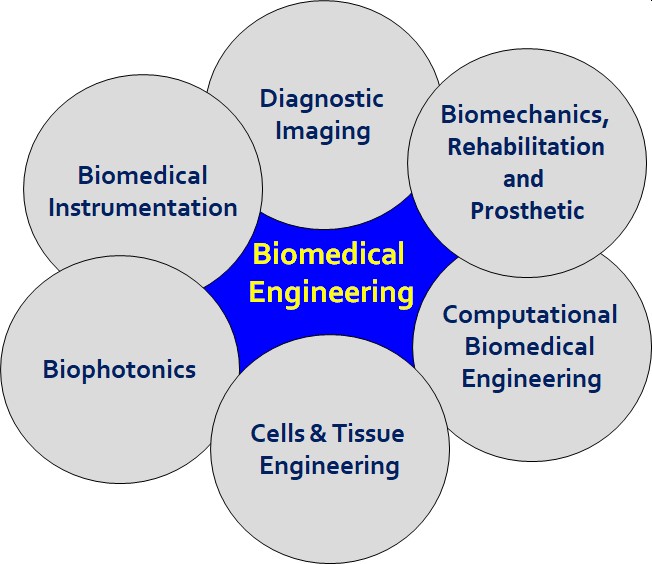
Freshman To Corporate Ladder
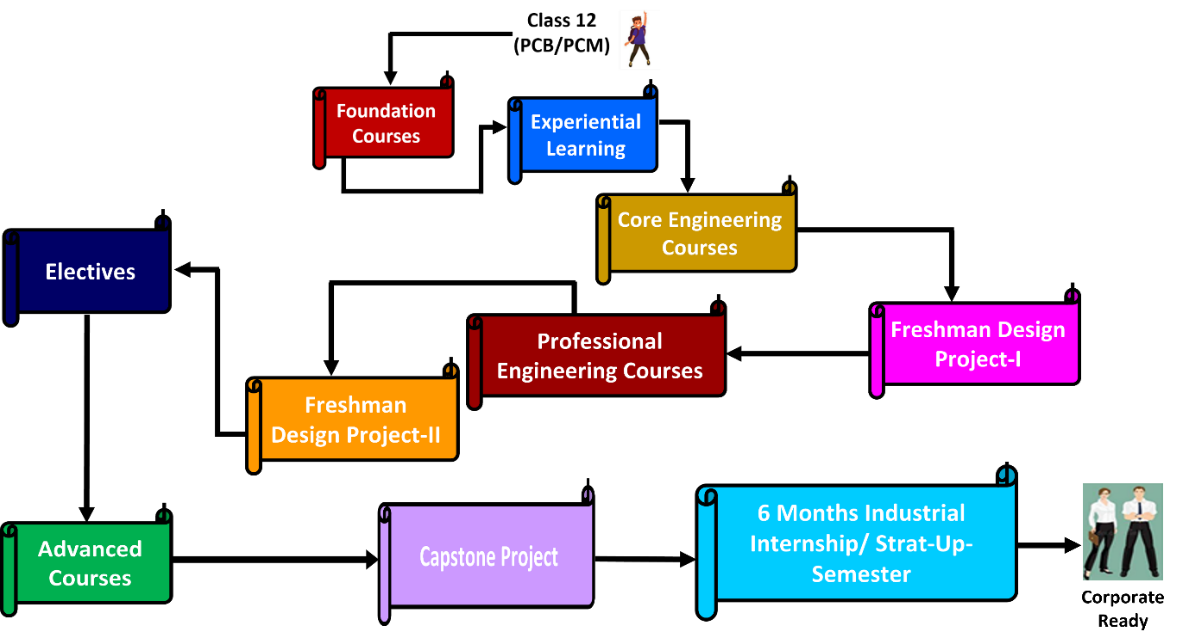
Role of Biomedical Engineers
- To understand modify, and control the biological system
- Detection, measurement and monitoring of physiological function
- To design and manufacture products that can monitor physiologic function
- Assist in the diagnosis and treatment of patients
- Supervise biomedical equipment's, maintenance, technical assistance and train authorized personnel to use equipment
- Investigate medical equipment's failure and or quality assurance
- With the help of engineering technologies, they help to create labs and units to be used in hospitals.
- Work in research & development
- To decide and create strategies for research through Artificial Intelligence
Program Educational Objectives
- Demonstrate technical competence in identifying, assessing and implementing creative, viable, cost-effective solutions in environmental, food, biochemical and biomedical engineering and technology.
- Graduates will be excellent professionals by enhancing their innovative biomedical engineering learning techniques to address global challenges and be a successful entrepreneur in developing field-related jobs.
- Prepare students who are able to work efficiently in collaborative and multidisciplinary environments that uphold professional and ethical values, or pursue higher education or research.
Program Specific Outcomes (PSOs)
- To apply knowledge of mathematics, sciences and professional subjects to formulate, interpret and analyse problems appropriate to Biomedical Engineering.
- To employ appropriate engineering techniques, skills, tools and research based knowledge to realize Biomedical Engineering systems and engage in life- long learning.
Program Outcomes (POs)
- Engineering knowledge: Apply the knowledge of mathematics, science, engineering fundamentals, and an engineering specialization to the solution of complex engineering problems.
- Problem analysis: Identify, formulate, review research literature, and analyze complex engineering problems reaching substantiated conclusions using first principles of mathematics, natural sciences, and engineering sciences.
- Design/development of solutions: Design solutions for complex engineering problems and design system components or processes that meet the specified needs with appropriate consideration for the public health and safety, and the cultural, societal, and environmental considerations.
- Conduct investigations of complex problems: Use research-based knowledge and research methods including design of experiments, analysis and interpretation of data, and synthesis of the information to provide valid conclusions.
- Modern tool usage: Create, select, and apply appropriate techniques, resources, and modern engineering and IT tools including prediction and modeling to complex engineering activities with an understanding of the limitations.
- The engineer and society: Apply reasoning informed by the contextual knowledge to assess societal, health, safety, legal and cultural issues and the consequent responsibilities relevant to the professional engineering practice.
- Environment and sustainability: understand the impact of the professional engineering solutions in societal and environmental contexts, demonstrate the knowledge of, and need for sustainable development.
- Ethics: Apply ethical principles and commit to professional ethics, responsibilities, and norms of the engineering practice.
- Individual and teamwork: Function effectively as an individual, and as a member or leader in diverse teams, and in multidisciplinary settings.
- Communication: Communicate effectively on complex engineering activities with the engineering community and with society at large, such as, being able to comprehend and write effective reports and design documentation, make effective presentations, and give and receive clear instructions.
- Project management and finance: Demonstrate knowledge and understanding of the engineering and management principles and apply these to one’s own work, as a member and leader in a team, to manage projects and in multidisciplinary environments.
- Life-long learning: Recognize the need for, and have the preparation and ability to engage in independent and life-long learning in the broadest context of technological change.
Admission Criteria
Through NEET and JEE (Mains) with both PCM (Physics, Chemistry and Mathematics) and PCB (Physics, Chemistry and Biology) students eligible for admission.
The institute offers two different options to pursue your undergraduate degree:
- Complete your program at Thapar and get an undergraduate degree of Biomedical Engineering from TIET.
or
- Complete your first two years at Thapar and next two years (3rd and 4th) you are going to study at University of Toledo, and finally get an undergraduate degree of Bioengineering from University of Toledo, USA.
About International Engineering Program:
The Institute offers an International Biomedical Engineering Program (BME) from the session 2019-20. This is a joint program between Electrical and Instrumentation Engineering Department, TIET Patiala and Bioengineering Department, University of Toledo, USA.
In line with its mission to provide world-class educational experience by incorporating global best practices in its format, TIET through its Center for International Relations announces a credit transfer International Engineering programme with University of Toledo, Ohio, USA. This unique program is designed to give students an international experience, prepare them for professional careers, and expose them to the state-of-the-art facilities and cutting-edge research in the fields of biomedical engineering. The program accentuation on engineering and entrepreneurship designed for students planning to move straightforwardly into the industry/research organization after completing the program. The primary focus of the program is on the development of medical devices and its functional application in the creation of new and novel healthcare devices.
Salient Features:
- Undergraduate degree from USA University: This is a joint program between Electrical and Instrumentation Engineering Department, TIET Patiala and Bioengineering Department, University of Toledo (UT), USA, in which students can study 2 years at TIET and 2 years at UT and will get an undergraduate degree in Bioengineering from UT.
- Affordable Fee Structure: In this program, the student will pay fees at TIET for the first two years of the program. For years 3 and 4, eligible students will pay the relevant UT fee for the course of study. By choosing this approach the student will pay substantially lower fees than their international counterparts who opt for a four-year program at UT. The students accepted at UT will also get a scholarship of $8500 per year based on CGPA obtained at the end of 2nd year at TIET for years 3 and 4(based on the performance of year 3) of their study at UT. During their study at UT the students will go three paid Co-operatives (Co-Op) in industry and the average Co-Op stipend is $6000 per Co-Op.
- Real-World Experience: Get ready to contribute to the work/job from day one. Our program graduates benefit from hands-on experiences from Co-operatives (Co-Op) to senior design projects. Three Co-Op is compulsory for each student to get a degree from UT and that will facilitate the students to move straightforwardly into the industry/research organization after completing the program.
- Undergraduate Research Opportunities: Plenty of our program faculties doing research in the field of biomedical engineering, therefore, students have research opportunities that will expose them to advanced technologies and hands-on training.
Department's Strength
- Several cutting edges funded research activities are going on ( nearly 2.2 Crores).
- Around 100 publications in the field of Biomedical Engineering over last 5 years in reputed journals
- Most of the faculty working in Biomedical Engineering have foreign exposure
Thrust Area
- Biomedical Signal and Image Processing
- Biomedical Devices and Instrumentation
- Health and Environment
- Biometrics
- Biomechanics
- Biomedical Control and System Biology
State of Art Laboratories
- Medical Instrumentation Lab
- Biomechanics Lab
- Biomedical Computational Lab
- Medical Imaging & Deep Learning Lab
- IoT and Wearable Devices Lab
- Fundamental of Life Sciences Lab
Government funded Projects:
|
Name of the Scheme/Project/ Endowments/ Chairs |
Name of the Principal Investigator |
Name of the Funding agency |
Year of Award |
Funds provided (INR in lakhs) |
Duration of the project |
|
CRG |
Vishal Srivastava |
SERB |
2022 |
45.73 |
3 Years |
|
SRG |
Gyanendra Singh |
SERB |
2022 |
32 |
3 Year |
|
TARE |
Sahaj Saxena |
SERB |
2021 |
18.3 |
3 Years |
|
DST |
Sangeeta Kamboj & Sahaj Saxena |
DST-Haryana |
2021 |
18 |
3 Years |
|
Extra Mural-ICMR |
Jainy Sachdeva |
ICMR |
2019 |
43.83 |
3 Years |
|
Extra Mural Research |
Vishal Srivastava |
SERB |
2017 |
35.96 |
3 Years |
|
Early Carrier Research |
Vishal Srivastava |
SERB |
2017 |
29.00 |
3 Years |
Career Opportunities:
The number of jobs in the biomedical engineering field has exploded. Employers love biomedical engineers graduates for their breadth of knowledge and hands-on Co-Op (Co-operative Education) and laboratory experience.
Some of the Biomedical Engineers employers are:
- Medical device manufacturers
- Pharmaceutical companies
- Regulatory agencies
- Medical research institutions
Probable List of Recruiters:
- GE Medical System
- Thorlabs
- New Port
- Amira
- Philips Electronics Ltd.- Medical Division
- Siemens
- Nikon
- Lica
- National Instruments
- Texas Instruments
- Aditiya Imaging
- Samsung
- Olympus
Capstone projects:
Following capstone projects have been successfully carried out by the students of Biomedical engineering:
- Smart Watch for Elderly people
- Physical Therapy Monitoring System for Leg Muscles Injuries
- Smart shoe for portable gait analysis and correction of abnormal walking pattern
Internships
A number of companies have been taking Biomedical students for internships, followed by pre-placement offers to a few students.
- Spinoff Technopark Pvt. Ltd.
- Smart Data Enterprises
- Y Hills Noida
- Boston Scientific
- Incruiter
- PGI Chandigarh
- FNZ
- Gentech
- Auptimo
- East West Concern Pvt. Ltd. Nepal
Course Structural Scheme
Click here to download scheme 2019
Click here to download scheme 2020
Click here to download scheme 2021
Click here to download scheme 2022
Click here to download scheme 2023
Click here to download scheme 2024
Capstone Projects
- Capstone 1- Click here to view
- Capstone 2- Click here to view
About the Program
The Electrical and Computer Engineering program at Thapar Institute of Engineering and Technology focuses on addressing the real-time challenges in computer science applications for various engineering problems including electrical engineering. In this program, students would learn and explore all subjects of Computer Science and Engineering such as Programming Languages (C/C++/Python), Data Structures, Database Management System (DBMS), Artificial Intelligence (AI), Embedded Systems and Internet of Things (IoT), Computer Networks, Robotics, Deep Learning Libraries (Tensorflow/PyTorch) and Platforms (Matlab/R/Octave) with applications to various Electrical Engineering domains such as Smart Electric Grid and Energy Management, Electric Vehicles and Real-Time Systems, Wearable Technologies, and Energy Efficient Lighting Techniques. The program offers a unique, interdisciplinary, balanced combination of tools, techniques, practices, and applications from the two most essential engineering disciplines namely Computer Engineering and Electrical Engineering.
Our industry-centric undergraduate program offers electives to cover at least five different sample career trajectories, which include High-End Computing, Information and Grid Security, Computer Animation and Gaming, Electrical Vehicles, and Mathematics and Computing. Along with this, our Outcome-Based Education (OBE) approach brings a good mix of design projects, industrial visits, project semesters, multidisciplinary capstone projects, and experiential learning activities to involve the brilliant youth towards world-class education and to enable them to contribute to the development of our society.
Curriculum: Salient Features
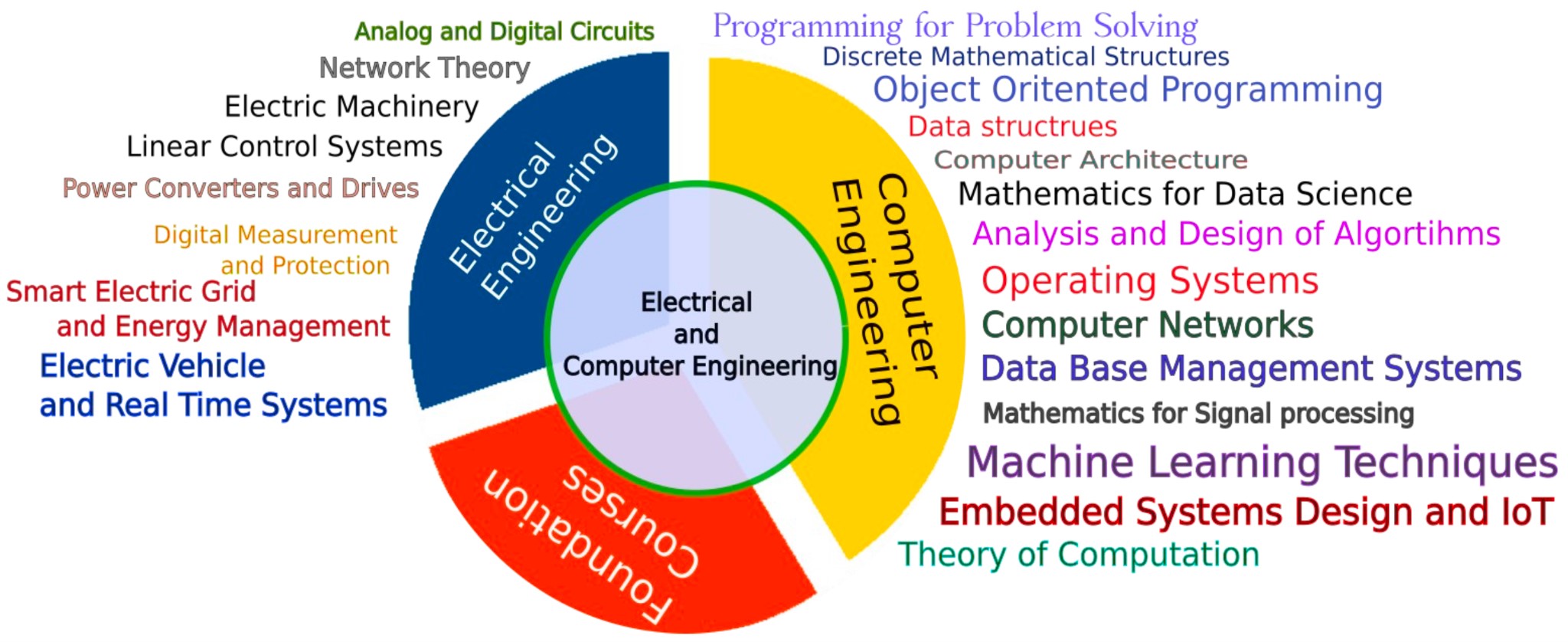
Sample Career Trajectories
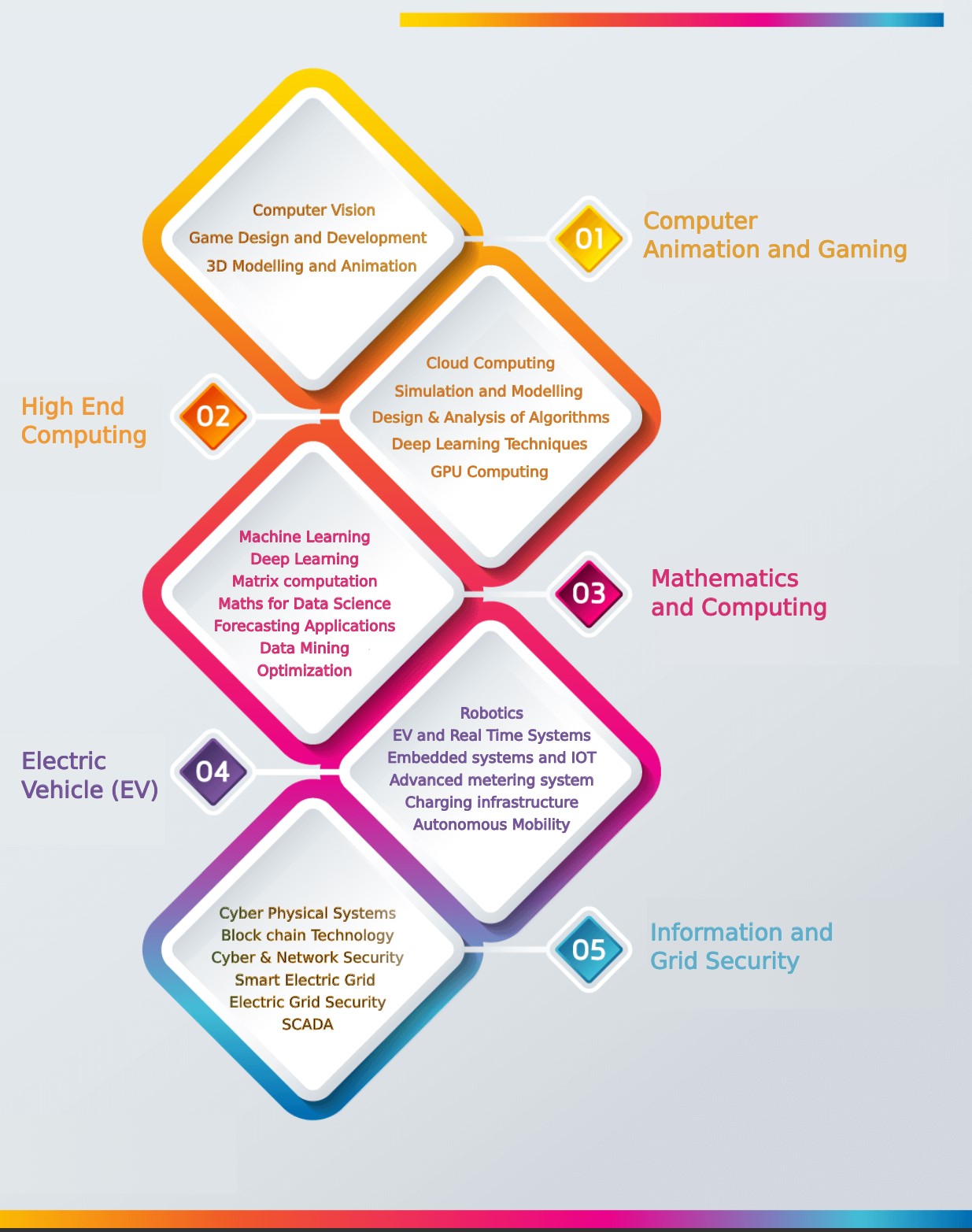
Capstone Project
Capstone projects are designed to encourage and assist the students to think, conceptualize, learn and develop skills such as planning, teamwork, public speaking, research by applying an engineering design process in computer science and electrical engineering. In the majority of the cases, the projects are interdisciplinary to encourage students to connect different areas and domains. Capstone projects are to emphasize hands-on experience and to integrate industry learning experience.
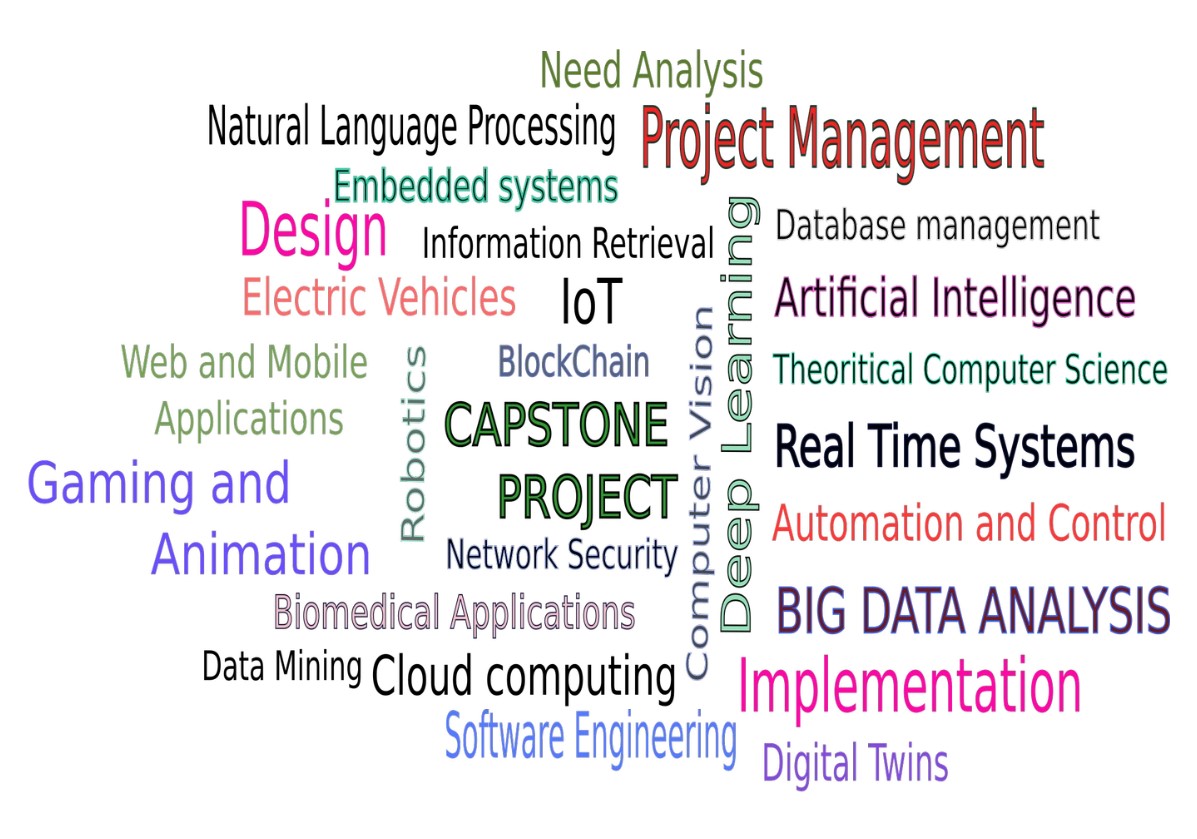
Program Educational Objectives (PEOs)
- Demonstrate technical expertise to provide solutions for complex problems by applying computer and electrical engineering skills.
- Advance in professional development and lifelong learning to stay up to date in the quickly evolving field of computer engineering and its application to real world problems.
- Achieve leadership roles in their profession by instilling professional ethics and code of professional conduct.
Program Specific Outcomes (PSOs)
PSO1:To apply knowledge of mathematics, sciences and professional subjects to formulate, interpret and analyse problems appropriate to Electrical and/or Computer Engineering.
PSO2:To employ appropriate engineering techniques, skills, tools and research based knowledge to realize Electrical and/or Computer Engineering based systems and engage in life- long learning.
Program Outcomes (POs)
- Engineering knowledge: Apply the knowledge of mathematics, science, engineering fundamentals, and an engineering specialization to the solution of complex engineering problems.
- Problem analysis: Identify, formulate, review research literature, and analyze complex engineering problems reaching substantiated conclusions using first principles of mathematics, natural sciences, and engineering sciences.
- Design/development of solutions: Design solutions for complex engineering problems and design system components or processes that meet the specified needs with appropriate consideration for the public health and safety, and the cultural, societal, and environmental considerations.
- Conduct investigations of complex problems: Use research-based knowledge and research methods including design of experiments, analysis and interpretation of data, and synthesis of the information to provide valid conclusions.
- Modern tool usage: Create, select, and apply appropriate techniques, resources, and modern engineering and IT tools including prediction and modeling to complex engineering activities with an understanding of the limitations.
- The engineer and society: Apply reasoning informed by the contextual knowledge to assess societal, health, safety, legal and cultural issues and the consequent responsibilities relevant to the professional engineering practice.
- Environment and sustainability: Understand the impact of the professional engineering solutions in societal and environmental contexts, and demonstrate the knowledge of, and need for sustainable development.
- Ethics: Apply ethical principles and commit to professional ethics and responsibilities and norms of the engineering practice.
- Individual and team work: Function effectively as an individual, and as a member or leader in diverse teams, and in multidisciplinary settings.
- Communication: Communicate effectively on complex engineering activities with the engineering community and with society at large, such as, being able to comprehend and write effective reports and design documentation, make effective presentations, and give and receive clear instructions.
- Project management and finance: Demonstrate knowledge and understanding of the engineering and management principles and apply these to one’s own work, as a member and leader in a team, to manage projects and in multidisciplinary environments.
- Life-long learning: Recognize the need for, and have the preparation and ability to engage in independent and life-long learning in the broadest context of technological change.
Recent Achievers and Student Testimonials
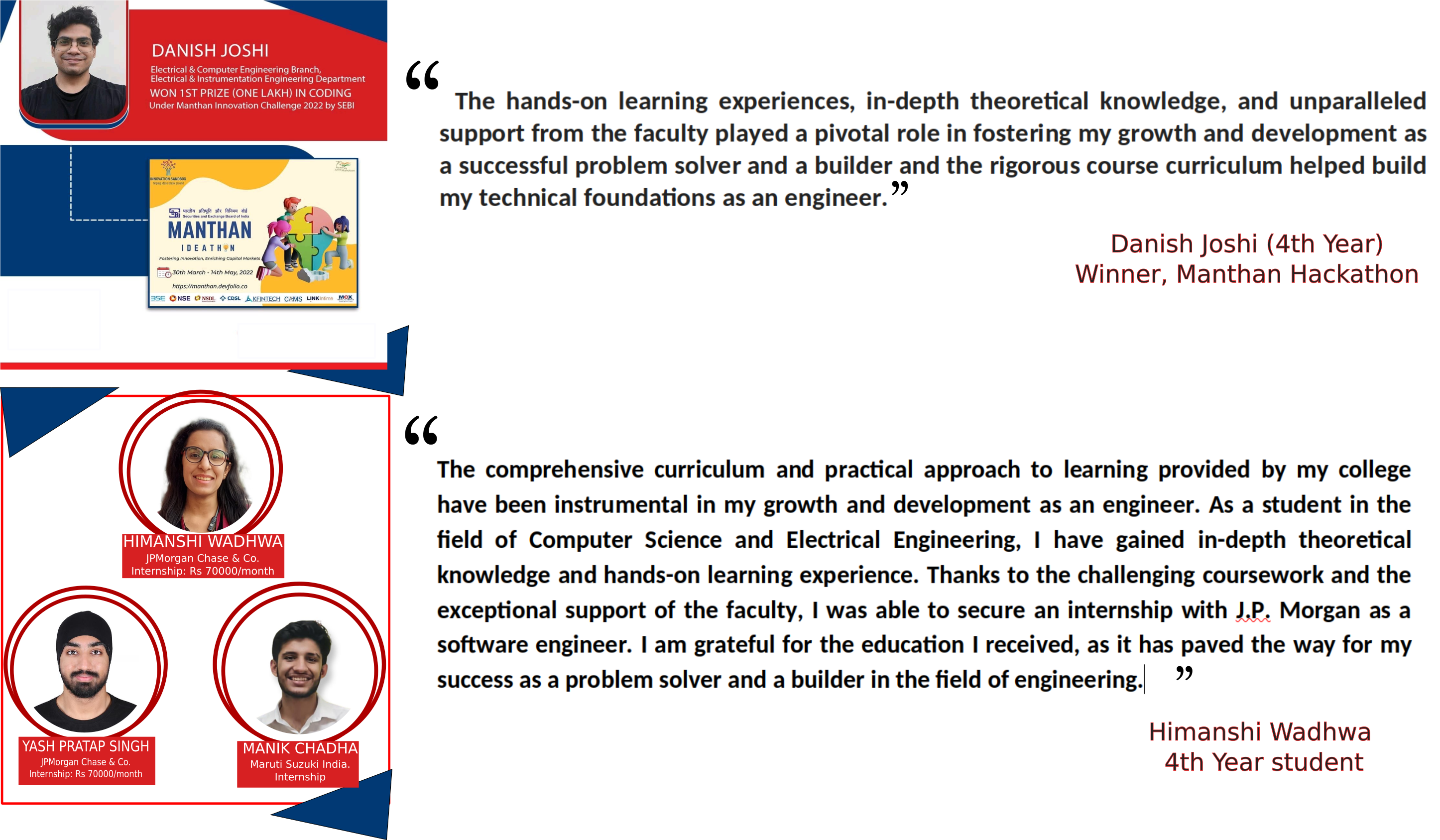
- BE_EEC_2020_SCHEME_SYLLABUS
- BE_EEC_2021_SCHEME_SYLLABUS
- BE_EEC_2022_SCHEME_SYLLABUS
- BE_EEC_2023_SCHEME_SYLLABUS
Capstone Project Videos
Capstone 1- Click here to view
Capstone 2- Click here to view
Capstone 3- Click here to view
Capstone 4- Click here to view
Capstone 5- Click here to view
Capstone 6- Click here to view
About M.E. Electric Vehicle Technology Program
The postgraduate program in Electric Vehicle Technology started in Electrical and Instrumentation Department in the year 2024. The Electrical Engineering programs of the department are accredited by National (NBA) and international (ABET) boards. By joining this program, the students will have opportunity to specialize in the most sought after disciplines through electives namely; Real time Systems, Smart grids, Renewable Energy, High Voltage technology, intelligent algorithms etc. To encourage the students in research based program in Electric Vehicle Technology, the institute offers a stipend of Rs 5000/month in addition to AICTE scholarship to GATE qualified students and Rs. 10,000/month to non-GATE students. The M.E. (Electric Vehicle Technology) program offers an opportunity for one-year industry internship, which helps the students to enhance research and academic skills and further provides an opportunity to get pre-placement offer. The placement office extends the support to invite slots for one-year internship in various MNCs R&D organizations. In previous years, the postgraduated students of power systems programe got the opportunity to work for their internships in C.G. Power, Savita Oil technologies, Tata Motors, LG Electronics, IIT Mandi, Azure Power, Stryker global technology etc. The graduates of the power systems program are well placed in various PSUs, Power grid, regional electricity board, Energy Efficiency board, and MNCs. Further, students got an opportunity to pursue their research career in various IITs.
Key Features of PG Program
- Curriculum Designed with 1+1 Pattern.
- One Year Industry Internship.
- Opportunity to Work in Sponsored Projects.
- State of Art Laboratory Infrastructure.
- Research Oriented Teaching Learning Approach.
- Academic Fellowship for All Admitted Students*.
Thrust Areas of Power System
- Electrical Vehicle
- Microgrid
- Power System Deregulation
- Multilevel Converters
- Power System Optimization
- Renewable Energy Sources
- Intelligent Drive Control
Selected Research Papers Published by M.E. (Power Systems) Students
|
S. No. |
Title |
Authors |
Journal |
Year |
|
1 |
Combined Heat and Power Economic Dispatch using Integrated Civilized Swarm Optimization |
Nitin Narang, Era Sharma and J.S. Dhillon |
Applied Soft Computing (Elsevier) |
2017 |
|
2 |
Design of Modified Droop Controller for Frequency Support in Microgrid Using Fleet of Electric Vehicles |
Rubi Rana, Mukesh Singh and S. Mishra |
IEEE Transactions on Power Systems (IEEE) |
2017 |
|
3 |
Energy Management and Voltage Stabilization in an Islanded Microgrid through an Electric Vehicle Charging Station |
Shakti Singh, Mukesh Singh, and Shubhangi Jagota |
Sustainable cities and societies (Elsevier) |
2018 |
|
4 |
Fuzzy Rough Set Based Energy Management System for Self-Sustainable Smart City |
Sumedha Sharmaa, Amit Dua, Mukesh Singh, Neeraj Kumar, Surya Prakash |
Renewable and Sustainable Energy Reviews (Elsevier) |
2018 |
|
5 |
Feasibility Study of A Grid Integrated Hybrid Solar-Wind Energy System Consisting an Electric Vehicle Charging Station |
Shakti Singh, Prachi Chauhan, NirbhowJap Singh |
Journal of Modern Power system and clean Energy (Springer) |
2019 |
|
6 |
A Hybrid Approach for Model Order Reduction and Controller Design of Large-Scale Power Systems |
Singhal, R., Srivastava, Y., Agarwal, S., Kumar, A., & Ganguli, S. |
Electrical and Electronic Devices, Circuits and Materials: Design and Applications (Taylor & Francis) |
2020 |
|
7 |
Parameter Estimation of Solar Cells: A State-of-The-Art Review with Metaheuristic Approaches and Future Recommendations |
Goyal, S., Nijhawan, P., & Ganguli, S |
Green Energy: Fundamentals, Concepts and Applications (Wiley) |
2020 |
|
8 |
A Heuristic Approach for Modelling and Control of Automatic Voltage Regulator (AVR) |
Singhal, R., Kumar, A., & Ganguli, S |
Electronic Devices, Circuits and Materials: Design and Applications, CRC Press (Taylor & Francis ) |
2020 |
|
9 |
An Intelligent Computing Technique for Parameter Extraction of Different Photovoltaic (PV) Models |
Goyal, S., Nijhawan, P., & Ganguli, S. |
Electrical and Electronic Devices, Circuits and Materials: Technological challenges and Solutions (Wiley) |
2020 |
|
10 |
A Heuristic- Based Appliance Scheduling Scheme for Smart Homes |
A. Jindal, B. S. Bhambhu, M. Singh, N. Kumar and K. Naik |
IEEE Transactions on Industrial Informatics (IEEE) |
2020 |
List of students (ME Power Systems) for Internship Opportunity: Click here to view
Achiever Students (ME Power Systems): Click here to view
Program Educational Objectives (PEOs)
- Apply and exchange high level of technical expertise in Electric Vehicle Technology and allied profession with effective communication and management skills
- Continue their intellectual and professional development by seeking knowledge and to involve in fostering innovative activities for the sustainable development to improve the quality of life.
Program Outcomes
- An ability to independently carry out research/investigation and development work to solve practical problems
- An ability to write and present a substantial technical report/document
- Students should be able to demonstrate a degree of mastery over the area as per the specialization of the program. The mastery should be at a level higher than the requirements in the appropriate bachelor program
Course Scheme
Click here to download 2017 Scheme
Click here to download 2019 Scheme
Click here to download 2020 Scheme
Click here to download 2024 Scheme (Electric Vehicle Technology)
